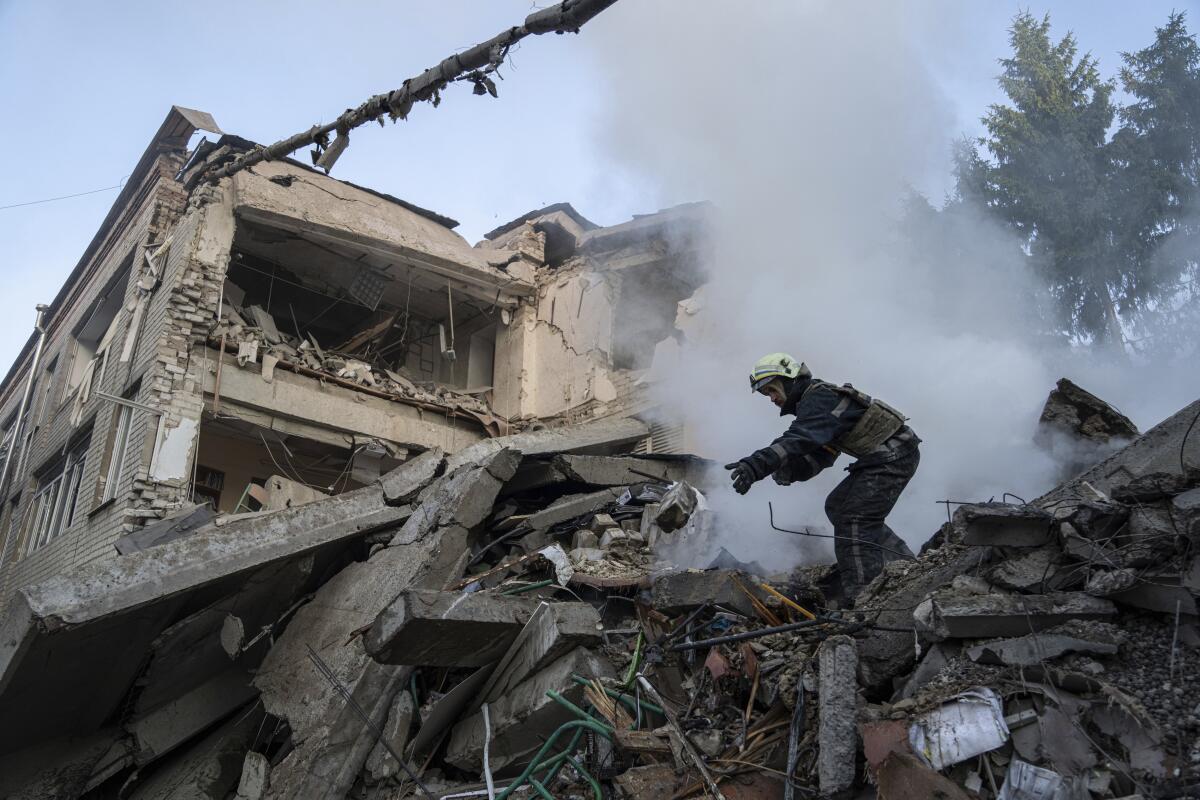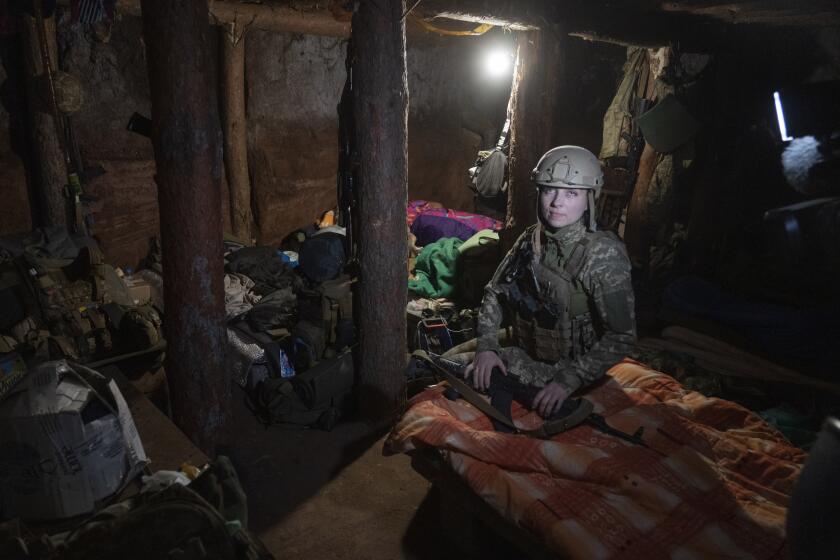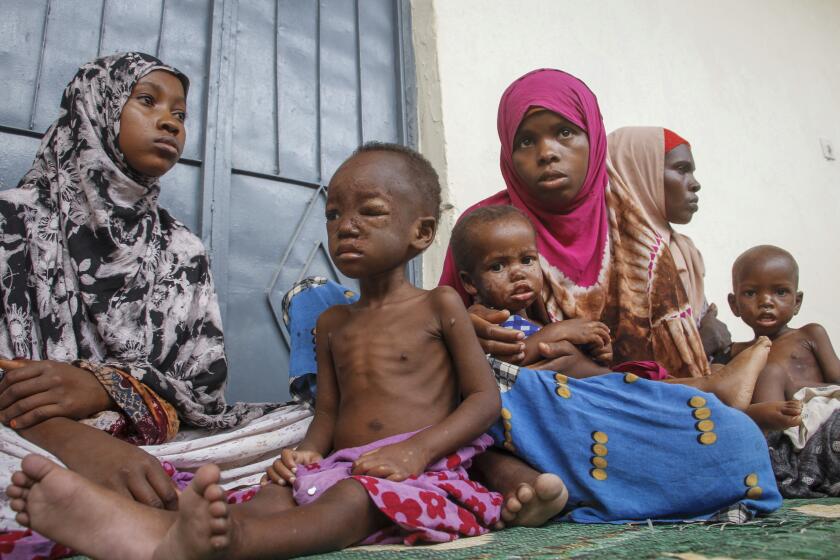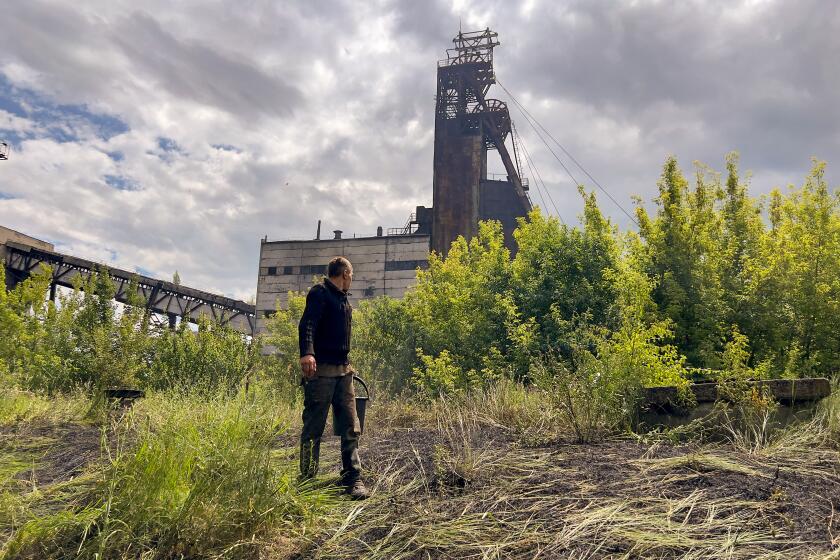‘Hell on Earth’: Ukrainian soldiers describe the eastern front

- Share via
BAKHMUT, Ukraine — Torched forests and cities burned to the ground. Colleagues with severed limbs. Bombardments so relentless the only option is to lie in a trench, wait and pray.
Ukrainian soldiers returning from the front lines in eastern Ukraine’s Donbas region — where Russia is waging a fierce offensive — describe the situation as apocalyptic in what has turned into a grueling war of attrition.
In interviews with the Associated Press, some complained of chaotic organization, desertions and mental health problems caused by relentless shelling. Others spoke of high morale, their colleagues’ heroism and a commitment to keep fighting, even as the better-equipped Russians control more of the combat zone.
Lt. Volodymyr Nazarenko, 30, second in command of the Ukrainian National Guard’s Svoboda Battalion, was with troops who retreated from Severodonetsk under orders from military leaders. During a month-long battle, Russian tanks obliterated any potential defensive positions and turned a city with a prewar population of 101,000 into “a burnt-down desert,” he said.
“They shelled us every day. I do not want to lie about it. But these were barrages of ammunition at every building,” Nazarenko said. “The city was methodically leveled out.”
At the time, Severodonetsk was one of two major cities under Ukrainian control in Luhansk province, where pro-Russia separatists declared an unrecognized republic eight years ago. By the time the order to withdraw came June 24, the Ukrainians were surrounded on three sides and mounting a defense from a chemical plant also sheltering civilians.
Putin’s declaration came as Russian forces tried to press their offensive deeper into eastern Ukraine after the Ukrainian military confirmed that its forces had withdrawn from Lysychansk.
“If there was a hell on Earth somewhere, it was in Severodonetsk,” Artem Ruban, a soldier in Nazarenko’s battalion, said from the comparative safety of Bakhmut, about 40 miles to the southwest of the since-captured city. “The inner strength of our boys allowed them to hold the city until the last moment.”
“Those were not human conditions they had to fight in. It is difficult to explain this to you here, what they feel like now or what it was like there,” Ruban said, blinking in the sunlight. “They were fighting until the end there. The task was to destroy the enemy, no matter what.”
Nazarenko, who also fought in Kyiv and elsewhere in the east after Russia invaded Ukraine on Feb. 24, considers the Ukrainian operation in Severodonetsk a victory despite the outcome. He said the defenders managed to limit casualties while stalling the Russian advance for much longer than expected, depleting Russia’s resources.
“Their army incurred huge losses, and their attack potential was obliterated,” he said.
Putin’s declaration came as Russian forces tried to press their offensive deeper into eastern Ukraine after the Ukrainian military confirmed that its forces had withdrawn from Lysychansk.
Both the lieutenant and the soldier under his command expressed confidence that Ukraine would take back all occupied territories and defeat Russia. They insisted that morale remained high. Other soldiers, most with no combat experience before the invasion, shared more pessimistic accounts while insisting on anonymity or using only their first names to discuss their experiences.
Oleksiy, a member of the Ukrainian army who started fighting against the Moscow-backed separatists in 2016, had just returned from the front with a heavy limp. He said he was wounded on the battlefield in Zolote, a town the Russians also have since occupied.
“On the TV, they are showing beautiful pictures of the front lines, the solidarity, the army, but the reality is very different,” he said, adding that he does not think the delivery of more Western weapons would change the course of the war.
His battalion started running out of ammunition within a few weeks, Oleksiy said. At one point, the relentless shelling kept the soldiers from standing up in the trenches, he said, exhaustion visible on his lined face.
Leading foreign ministers meet to confront global food insecurity crisis, facing conflict, climate change and COVID. Millions could die.
A senior presidential aide reported last month that 100 to 200 Ukrainian troops were dying every day, but the country has not provided the total number killed in action. Oleksiy said his unit lost 150 men during its first three days of fighting, many from loss of blood.
Because of the relentless bombardments, wounded soldiers were evacuated only at night, and sometimes they had to wait for up to two days, he said.
“The commanders don’t care if you are psychologically broken. If you have a working heart, if you have arms and legs, you have to go back in,” he added.
Mariia, a 41-year-old platoon commander who joined the Ukrainian army in 2018 after working as a lawyer and giving birth to a daughter, said the level of danger and discomfort can vary greatly depending on a unit’s location and access to supply lines.
Start your day right
Sign up for Essential California for the L.A. Times biggest news, features and recommendations in your inbox six days a week.
You may occasionally receive promotional content from the Los Angeles Times.
Front lines that have existed since the conflict with pro-Russia separatists began in 2014 are more static and predictable, whereas places that became battlegrounds since Russia sent its troops in to invade are “a different world,” she said.
“We are the descendants of Cossacks, we are free and brave. It is in our blood,” she said. “We are going to fight to the end.”
Two other soldiers whom the AP interviewed — former office workers in Kyiv with no prior battle experience — said they were sent to the front lines in the east as soon as they completed their initial training. They said they observed “terrible organization” and “illogical decision-making,” and many people in their battalion refused to fight.
One of the soldiers said he smokes marijuana daily. “Otherwise, I would lose my mind, I would desert. It’s the only way I can cope,” he said.
Relentless Russian artillery barrages have battered Ukraine’s powerful coal industry and endangered miners working underground. “No one wants to risk getting trapped down there,” said one.
A 28-year-old former teacher in Slovyansk who “never imagined” he would fight for his country described Ukraine’s battlefields as a completely different life, with a different value system and emotional highs as well as lows.
“There is joy, there is sorrow. Everything is intertwined,” he said.
Friendship with his colleagues provide the bright spots. But he also saw fellow soldiers succumbing to extreme fatigue, both physical and mental, and displaying symptoms of PTSD.
“It’s hard to live under constant stress, sleep-deprived and malnourished. To see all those horrors with your own eyes — the dead, the torn-off limbs. It is unlikely that someone’s psyche can withstand that,” he said.
Yet he, too, insisted that the motivation to defend their country remains.
“We are ready to endure and fight with clenched teeth. No matter how hard and difficult it is,” the teacher said, speaking from a fishing store that was converted into a military distribution hub. “Who will defend my home and my family, if it is not me?”
The center in the city of Sloviansk provides local military units with equipment and provisions, and gives soldiers a place to go during brief respites from the physical grind and horrors of battle.
Tetiana Khimion, a 43-year-old dance choreographer, set up the center when the war started. All kinds of soldiers pass through, she says, including skilled special forces and war-hardened veterans as well as civilians-turned-fighters who signed up only recently.
“It can be like this: For the first time he comes, smiles widely, he can even be shy. The next time he comes, and there is emptiness in his eyes,” Khimion said. “He has been through something, and he is different.”
Behind her, a group of young Ukrainian soldiers on rotation from the front lines sit sharing jokes and a pizza. The thud of artillery can be heard a few miles away.
“Mostly they hope for the better. Yes, sometimes they come in a little sad, but we hope to raise their spirits here, too,” Khimion said. “We hug, we smile at each other and then they go back into the fields.”
On Sunday, Russian forces occupied the last Ukrainian stronghold in Luhansk province and stepped up rocket strikes on Donetsk, the Donbas province where the center is.
More to Read
Sign up for Essential California
The most important California stories and recommendations in your inbox every morning.
You may occasionally receive promotional content from the Los Angeles Times.
















